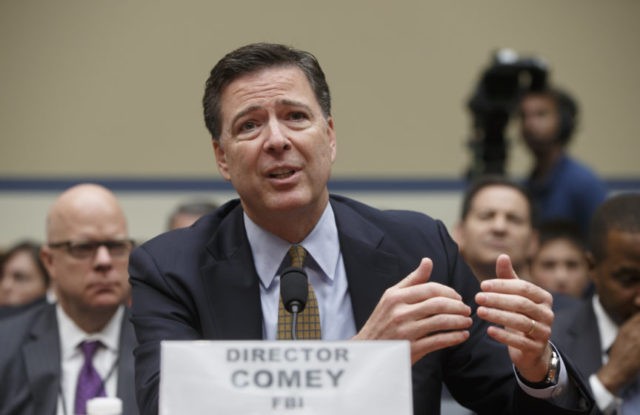Fix Is In: Comey Praised DNC-Hired Cybersecurity Firm Even After Botched Report
Crowdstrike, the cybersecurity company working for the Democratic National Committee (DNC), released a report tying “Russian hacking” to an incident that never happened, yet even after the report had been debunked, FBI Director James Comey still referred to Crowdstrike as a “highly respected private company” at a Senate hearing.

Executives from Crowdstrike and Director Comey are both scheduled to testify in front of the House Intelligence Committee set for Monday morning at 10 am.
By issuing a still-unrestricted report about an incident that never happened and then tying it to the alleged Russian hacks that Democrats claim tipped the elections for Pres. Trump, the DNC-employed Crowdstrike’s credibility deserves to be called into question, however, despite excellent reporting by cybersecurity expert Jeffrey Carr, Bloomberg’s Leonid Bershidsky, and Voice of America reporter Oleksiy Kuzmenko, the media has ignored the story and continued to cite Crowdstrike’s work… even after the Ukrainian Defense Ministry issued a statement on January 6th, 2017 refuting Crowdstrike’s claims.
Even more troubling than the media malfeasance about the discredited Crowdstrike report, in testimony in front of the Senate intelligence committee on January 10 – four days after the Ukrainian DOD denied Crowdstrike’s report — Director Comey admitted that the FBI had been denied access to the DNC servers and praised Crowdstrike, without mentioning that they worked for the DNC or that their recent report had been debunked.
The Crowdstrike report, titled “Use of Fancy Bear Android Malware in Tracking of Ukrainian Field Artillery Units“, was issued by the company on December 22, 2016. It’s a slickly produced document, with a frightening comic book-style cover and plenty of charts and graphs. Crowdstrike’s villain in the report is Fancy Bear, which they say is a hacking group controlled by Russia’s GRU intelligence agency. Crowdstrike itself gave the group the name Fancy Bear, with ‘Bear’ referring to Russia and ‘Fancy’ referring to the song Fancy by Iggy Izalea.
On June 15, 2016 Crowdstrike claimed that Fancy Bear was behind the DNC hacks in an article title Bears in the Midst: Intrusion into the Democratic National Committee. That post came the day after the Washington Post published an article claiming Russian government hackers penetrated DNC and stole opposition research on Trump, quoting Crowdstrike’s co-founder Dmitri Alperovitch, who is scheduled to testify Monday in front of the House Intel committee hearing. In that June WaPo article, Alperovitch seemed unsure on details but pinned the hack on Fancy Bear:
CrowdStrike is not sure how the hackers got in. The firm suspects they may have targeted DNC employees with “spearphishing” emails. These are communications that appear legitimate — often made to look like they came from a colleague or someone trusted — but that contain links or attachments that when clicked on deploy malicious software that enables a hacker to gain access to a computer. “But we don’t have hard evidence,” Alperovitch said. The two groups did not appear to be working together, Alperovitch said. Fancy Bear is believed to work for the GRU, or Russia’s military intelligence service, he said.
In light of his possible testimony Monday, it’s worth noting Alperovitch’s statements in the June 2016 Washington Post article that there’s no “hard evidence” of how the hack occurred and that Fancy Bear is “believed to work” for GRU.
That June WaPo article also quoted Crowdstrike’s President and former FBI agent Shawn Henry, who is also scheduled to testify Monday.
“It’s the job of every foreign intelligence service to collect intelligence against their adversaries,” said Shawn Henry, president of CrowdStrike, the cyber firm called in to handle the DNC breach and a former head of the FBI’s cyber division. He noted that it is extremely difficult for a civilian organization to protect itself from a skilled and determined state such as Russia.
If Henry’s statement to the Washington Post seems more political than technical, that’s because Crowdstrike was being utilized by their clients at the Democratic National Committee to put out a narrative about Russian hacking to use against the Trump campaign. As later confirmed by a laudatory piece in Esquire magazine, starting in June 2016 the DNC used Crowdstrike executives Alperovitch and Henry as part of an anti-Trump publicity plan related to allegations of Russian hacking:
http://www.breitbart.com/big-government/2017/03/20/fix-is-in-comey-praised-dnc-hired-cybersecurity-firm-even-after-botched-report/